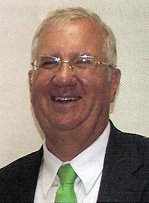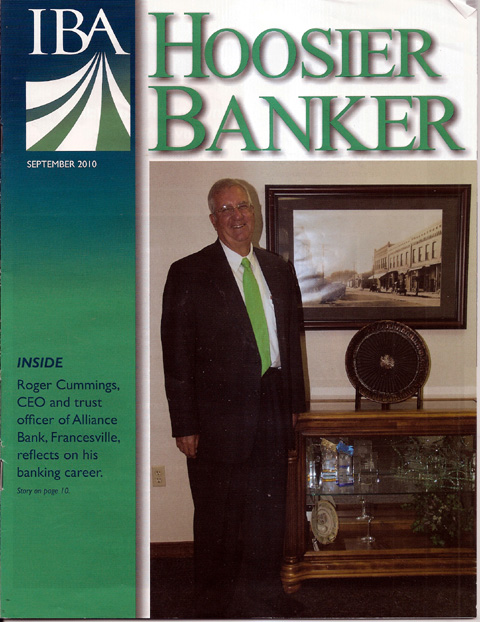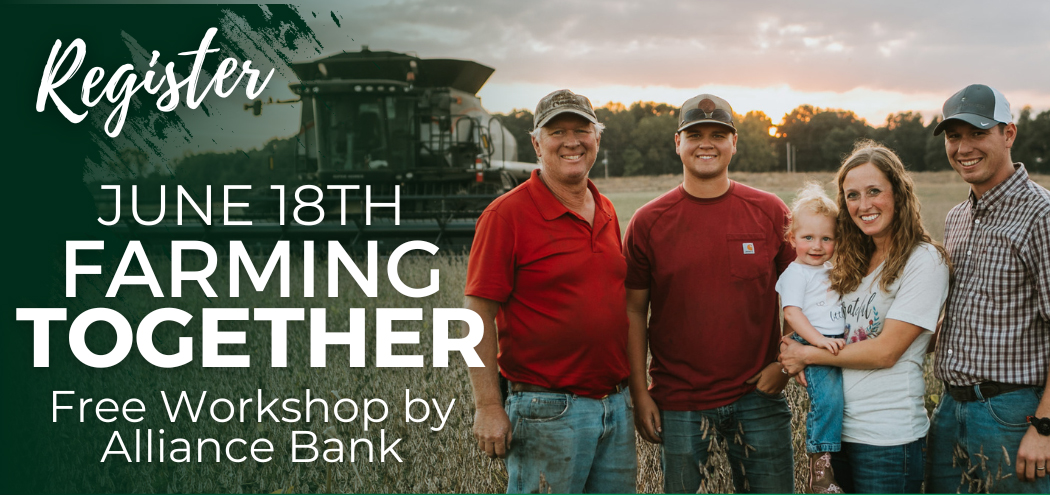From September 2010 Hoosier Banker
Roger Cummings: Career Roundup
By Laura Wilson, Vice President-Communications, Indiana Bankers Association
"I truly believe that my faith has opened many doors of opportunity for me,” reflects Roger D. Cummings, president, chief executive officer and trust officer of Alliance Bank, Francesville. “I never dreamed of being a banker, let alone a bank CEO.”
 Until April of this year, Cummings also served the bank as president, but transitioned out of that role in anticipation of full retirement at year-end.
Until April of this year, Cummings also served the bank as president, but transitioned out of that role in anticipation of full retirement at year-end.
Initially Cummings planned to become an accountant. In preparation he earned an associate’s degree in business administration and finance from International Business College. When he completed his studies in 1967, the Vietnam War was in full swing, making it difficult for young men of draft age to be hired.
“So I enlisted in the Navy,” he says.
Cummings’ four years of naval service included a tour of duty in Vietnam and two years aboard the USS Puget Sound, stationed in Newport, R.I. He attained the rank of storekeeper second class and received a Navy commendation medal for his service in Vietnam.
Once discharged, Cummings accepted a temporary post with the Jasper County Farm Bureau Co-op in Rensselaer. One day, depositing his paycheck at the local bank, a chance conversation with his former Sunday school teacher—who worked at the bank—led to a job lead.
“I didn’t even know what bankers did,” admits Cummings. But he applied and was hired as a loan teller at Farmers & Merchants National Bank, where he remained for nearly a decade. Cummings refers to that career phase as “a great experience in working with customers and seeing how the frontline of a bank worked.” Eventually he was promoted to controller.
In 1980 Cummings received an offer to join Peoples State Bank of Francesville, in the areas of lending, accounting and management. “I found myself learning lending at an ag bank in 1980,” recalls Cummings, “in the middle of the ag crisis. It was an educational opportunity, working with distressed customers in a tough economic cycle. I learned that most people want to pay their obligations, if given a chance.”
Cummings performed well at Peoples State Bank and, in 1992, was promoted to president and CEO. Fifteen years later, the bank merged with State Bank of Oxford and rebranded itself as Alliance Bank. That same year, 2005, Cummings was elected chairman of the Community Bankers Association of Indiana.
Cummings has been active with the banking community throughout his career. He served on the Indiana Bankers Association board of directors after its merger with CBAI. Currently he is a member of the Regulatory Review Committee of the Independent Community Bankers of America.
Community outreach includes service as treasurer of the First Christian Church of Francesville; treasurer and board member of the Humanitarian Distribution Center, in Francesville; member and past president of the Francesville Lions Club; president of Pulaski West Developers Inc.; and president of the Francesville Fall Festival. He has been filling active roles with the festival for 25 years. Past affiliations include: board member of Pulaski Community Development Commission; treasurer and board member of Junior Achievement of Pulaski County; and a board member of the Jasper Foundation. Cummings also bolstered his banking training by completing studies at the School of Bank Administration at the University of Wisconsin.
 Hoosier Banker recently interviewed Roger Cummings about his career and upcoming retirement plans.
Hoosier Banker recently interviewed Roger Cummings about his career and upcoming retirement plans.
Q: As president/CEO/trust officer of Alliance Bank, how would you describe your day-to-day banking responsibilities?
A: “My role has changed substantially since the merger of Peoples State Bank of Francesville and the State Bank of Oxford in 2005. The blending of two independent banks resulted in a highly experienced and talented management pool. Having such a strong management team makes my job easier. “In the process of building our team, my involvement in daily operations has been reduced. I’m now more involved in keeping up on changes and looking for ways we can continue to grow and remain profitable. With the economic downturn, we are less focused on expansion and more focused on dealing with regulatory and loan challenges.
“Currently my job is to work myself out of a job. I turn 64 in September, I am retiring effective Dec. 31, and we have capable new leadership lined up through Terry Stevens, our chief financial officer. He was named president in April and will assume full leadership in January 2011. Terry has been with our bank since 1987.
“Fortunately we have solid staff in-house as a result of the merger. There’s great strength in our organization.”
Q: What observations do you have about what worked well in your merger?
A: “The experts say that no merger is completely smooth, but ours was as smooth as it can get. It takes about a year-and-a-half to two years to really get everybody blended together.
“Our approach was to look at everything we were both doing, lay it out on the table, and ask, ‘Is this better, or is that better?’ ‘Is there something else out there that we need to look at?’ That’s basically how we approached every step of the blending.
“What helped us was that we did not eliminate any positions. Instead we changed them to build a unified management team. We’ve been able to utilize everyone’s experience.
“Another advantage is that we did not have to deal with conflicting data systems, because we were both CSI banks. Issues with data systems can be disruptive to customers, but we did not face that challenge. It
was as seamless as possible.
“The key in any merger is communication. We spent a lot of resources upfront on the communication side with our customers and also internally. Our emphasis was on working together to create a stronger bank.”
Q: In 2004 you wrote a letter to FDIC regulators, stating, “I would greatly appreciate an honest effort to reduce regulations.” How has the regulatory environment changed since then?
A: “The regulatory environment is one reason I chose to retire at the end of this year, instead of waiting until next year. With all these regulations coming so fast, I decided that it was time to move on. I know several bankers who are doing the same.
“The current environment is a nightmare. It’s creating jobs for a lot of people in consulting firms, but our customers and the bank are paying for those jobs.
“Increased regulations are not benefiting our customers. Take home mortgages, for example. Customers don’t understand the documentation that they sign. They rely on whoever’s sitting across the desk to explain to them where to sign and why, then walk out with a book they’re never going to read.
“It’s a paradox that the community banks that are treating their customers correctly and trying to help them are facing increased regulations. Community banks and our customers are paying the price.”
Q: What is your work philosophy?
A. “It is to lead by example. My parents instilled a strong work ethic in me, and I have tried to pass it on to my kids and model it for staff. One can accomplish a lot with hard work.
“We have a great team at Alliance. One of my goals is to hire good people and let them do their jobs. If given the opportunity, most employees will take ownership of what they are doing.
“Another part of my philosophy is to work with a servant’s heart. When we help others, we are helping ourselves in one way or another. Most of our people are involved in community organizations or events. “We encourage staff to get involved.
We give reward points for outside activities, and we provide paid time to clean up parks, etc., for our summer of service tour.’ We are committed to being a responsible member of the communities we serve.”
Q: Please tell a bit about the fall festival that you are involved with.
A: “It’s called the Francesville Fall Festival. It takes place the third weekend in September each year—Friday evening, Saturday and Sunday. I’m serving as president.
“I got involved with the festival by chance. After I had been with the bank a couple of years, the local planners wanted a new slogan. They posted a box in our lobby and ran a contest, inviting people to submit suggestions.
“One day I jotted down an entry and stuffed it in the box. I wrote, ‘Small town with a big heart.’
“They adopted it and invited me to come to a meeting. I went, and they gave me a cap with the slogan and a logo they had created. By the time I left the meeting, I was in charge of the pork chop dinner for the next ear’s festival.
“That was over 25 years ago, and I’ve been involved ever since. The past few years I’ve served as president.
“For a small town like Francesville, with a population of 900, an annual festival is one of the few unifying events. Our school systems have consolidated, so we’ve lost that identity. An event like the Francesville Fall Festival can pull a community together.”
Q: You served the Community Bankers Association of Indiana as 2005 chairman. How does a bank benefit from trade association membership?
A: “Our state association fills two primary roles for us. One is staff education. We invest a lot in keeping our staff informed, and we value the benefit of live meetings.
“The other area is the legislative arena. We don’t have the expertise or time to follow all the proposed legislation to determine how we might be affected. We rely on our trade associations to keep us informed.
“A side benefit of involvement is networking. Through my involvement in the state trade association at the board level, I have developed friendships throughout the state. I can pick up the phone or e-mail a peer group and get answers to any question I might have. It has been a great resource for me.
“The year I served as CBAI chairman was a milestone for me. It coincided with my career advancements to more managerial functions. On a personal level, it stretched me out of my comfort zone in a good way.
“I had always been more of a background person, not one to get up and give speeches. After my year of service, I felt comfortable with the process of putting together notes and preparing speeches. The experience helps me still, anytime I give a speech.
“Since that experience, I have encouraged other staff to be involved in outside banking activities.”
Q: Please describe how you have been impacted by an influential person in your life.
A: “It is hard for me to identify any one person, because there have been many. There were my parents, who raised me in a Christian environment and had a strong work ethic. And there were the many people throughout my career who gave me the opportunity to learn.
“My grandfather stands out as a role model. He could do anything—tasks around the farm, build a home—he’d tackle anything. Observing him, I realized that a person can do almost anything if they put their mind to it. My grandfather taught me that.”
Q: How do you plan to spend time in your retirement?
A: “I’m looking forward to an active retirement. My wife Judy and I have built a home and are currently emodeling a house we moved into in 2009 in Rensselaer. We are both handy with tools and enjoy the challenge of doing it yourself. Judy’s never seen a flower she doesn’t like, so there’s always landscaping work to do, too.
“Fishing and travel are part of my retirement plans. I enjoy fishing in a remote camp in Canada each year, but I also look forward to fishing locally. I’ve got a boat that currently isn’t getting much of a work out—in the future, I hope to be able to answer the call whenever somebody says, ‘The fish are biting.’
“For travel, we like remote areas vs. the high-tourist areas. We plan to spend time in Florida next winter in a little fishing village on the edge of the Everglades. Next summer we’re heading out to Montana, where we’ve rented a cabin.
“Mostly I look forward to more time with family. Judy and I have three wonderful kids. Sara and Brian both live near Indianapolis, and Chad lives near Batesville. The three have blessed us with seven grandchildren, who we love to spoil.”
Q: What have you most enjoyed about your banking career?
A: “The greatest enjoyment is being part of our customers’ and employees’ lives. As I drive around the countryside, I look around and see where we’ve helped customers and businesses achieve their goals. hat’s very satisfying.
“Being a community bank is important to all of us at Alliance Bank. Our bread and butter is working with our customers closely—not treating them like numbers—and being involved in the community. We’re all working together to make our community a better place.
“I am fortunate to work with a great team. The members have changed over the years, but we have remained focused on the customer and running a sound and profitable bank.”
Courtesy of Indiana Bankers Association, September 2010 Hoosier Banker magazine.







